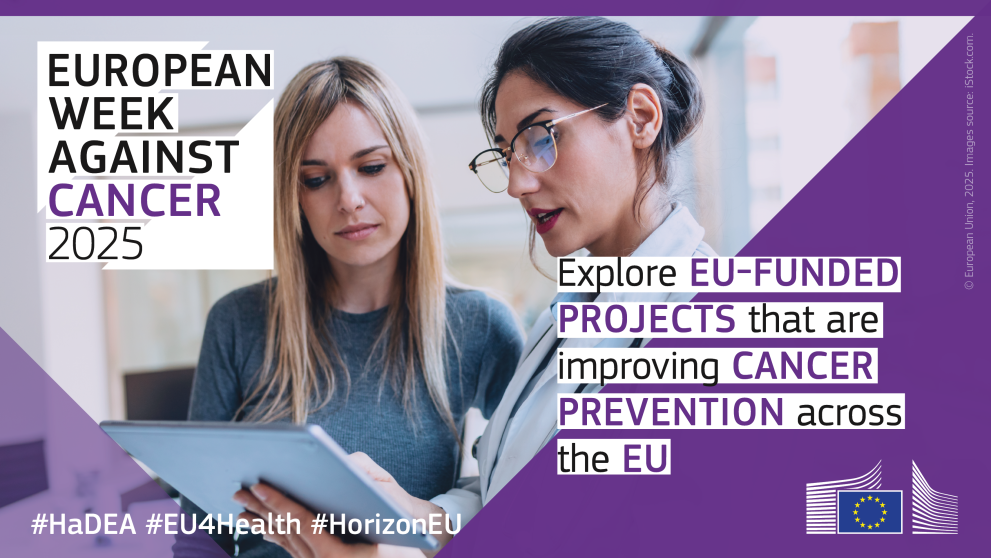
The European Week Against Cancer takes place between 25 and 31 May each year and brings together European Cancer Leagues, health advocates, civil society groups, policymakers and cancer patients and people with a history of cancer to raise awareness about the importance of cancer prevention and care.
According to Eurostat, cancer was the leading cause of death for both men and women aged less than 65 years in the EU in 2021. Based on current scientific evidence by the International Agency for Research on Cancer (IARC), at least 40% of all cancer cases worldwide could be prevented with effective primary prevention measures.
Explore a selection of EU-funded projects, some of which have concluded since last year’s European Week Against Cancer. Managed by HaDEA, these projects aim to boost cancer prevention efforts across the EU.
EU4Health
The ReThinkHPVaccination project has:
- Combined personalised communication strategies, training programmes, and international knowledge-sharing to boost HPV vaccination to reduce the risk of HPV-related cancers;
- Created a virtual knowledge centre, providing evidence-based resources to raise awareness in countries with low vaccination rates;
- Implemented pilot programmes in Romania, offering training sessions to healthcare professionals, community leaders and policymakers;
- Launched a communication campaign, emphasising the importance of HPV-vaccination for cancer prevention, which has reached over one million people through traditional and social media.
The PROTECT-EUROPE project has:
- Analysed and identified key factors that help improve communication between healthcare providers, public health services and young people and their carers, thus, contributing to improving the uptake of (gender-neutral) HPV vaccination across Europe;
- Developed 10 masterclasses on topics ranging from HPV epidemiology to access to vaccination. Each of them included case studies on successful delivery of HPV immunisation;
- Created a report which covers 26 tailored recommendations for stakeholders to enhance HPV vaccination efforts, including guidelines for healthcare professionals to strengthen trust and address vaccine-related concerns effectively as well as strategies for impactful tailored public health campaigns.
Eliminating cervical cancer and other cancers caused by human papillomaviruses is a flagship of the Europe's Beating Cancer Plan.
BUMPER (Boosting the usability of the EU Mobile App for cancer prevention) has supported the design and the development of the EU mobile app for cancer prevention through the widespread dissemination of the European Code Against Cancer recommendations amongst a broad and diverse population. The EU mobile app aims to influence the users’ health behaviour and help them adopt daily life-changing habits, thus, ultimately, acting as a tool for cancer prevention. Importantly, the project has addressed differences in health literacy of potential users to better connect with marginalised and vulnerable groups and help adapt the content of the app to their needs.
The EU4Health programme also finances the public procurement service contract responsible for the design, development, piloting and delivery of the EU mobile app for cancer prevention.
EUROHELICAN aimed to accelerate gastric cancer reduction in Europe by eradicating the bacteria Helicobacter pylori (H. pylori), a primary cause of infection-related cancer responsible for most non-cardia gastric cancers. Project results in Slovenia and Latvia suggest that the ‘screen-and-treat' strategy is feasible for implementation as a new preventive screening programme, and that the H. Pylori eradication strategy has some beneficial long-term effects. Another important achievement is the report from IARC, providing guidance on the implementation of population-based H. pylori ‘screen-and-treat' strategies for gastric cancer prevention.
Horizon Europe/Cancer Mission
The 4P-CAN project is on a mission to tackle major modifiable risk factors for cancer. By understanding barriers to policy implementation and individual adherence to healthy behaviours, 4P-CAN will improve primary prevention activities and reduce inequalities in Eastern European countries.
Initiated in 2023 as part of the project, the Leresti Living Lab serves as a good example of community-driven innovation in cancer prevention and has now become a dynamic hub for citizen and stakeholder engagement, scientific inquiry and real-world implementation of the European Code Against Cancer.
By 2025, the work has significantly progressed, and the Living Lab has:
Expanded the thematic scope from the first three community-identified risk factors—obesity, nutrition, physical inactivity—to include smoking, alcohol consumption, radon and UV exposure;
Extended the geographical reach from Leresti, Romania to 12 additional rural localities in the region;
Scaled up nationally by forming partnerships with key professional societies, including the Romanian Society of Pulmonology and the Romanian Society of Dermatology, to disseminate prevention messages in clinical practice and public education;
Gone cross-border, supporting project partners in Plovdiv, Bulgaria in their uptake of the 'Leresti model’ and introduction of local Living Lab activities.
Relevant links
Background
EU4Health is the fourth and largest of the EU health programmes. The EU4Health programme goes beyond an ambitious response to the COVID-19 crisis to address the resilience of European healthcare systems. The programme provides funding to national authorities, health organisations and other bodies through grants and public procurement, contributing to a healthier Europe. HaDEA manages the vast majority of the total EU4Health budget and implements the programme by managing calls for proposals and calls for tenders.
Details
- Publication date
- 27 May 2025
- Author
- European Health and Digital Executive Agency
- Programme Sector
- Health
- Programme
- EU4Health
- Horizon Europe Cluster 1: Health
- Tags
- EUFunded
- HealthUnion
- Public health
